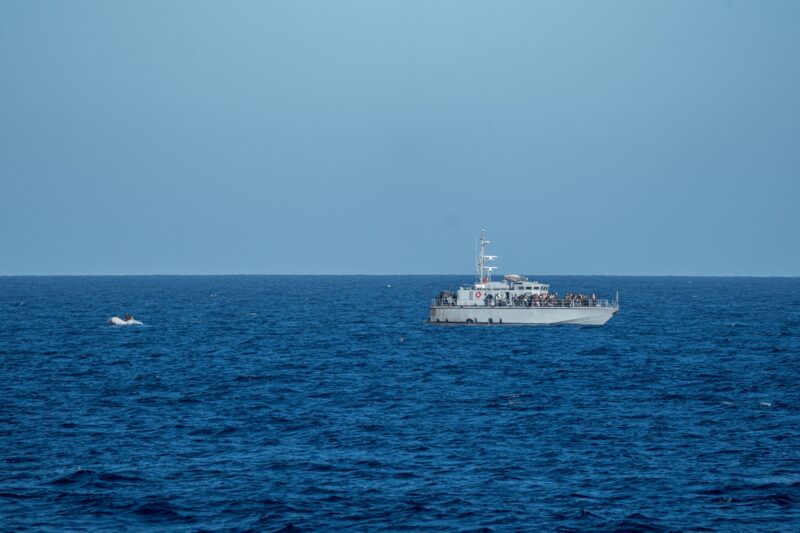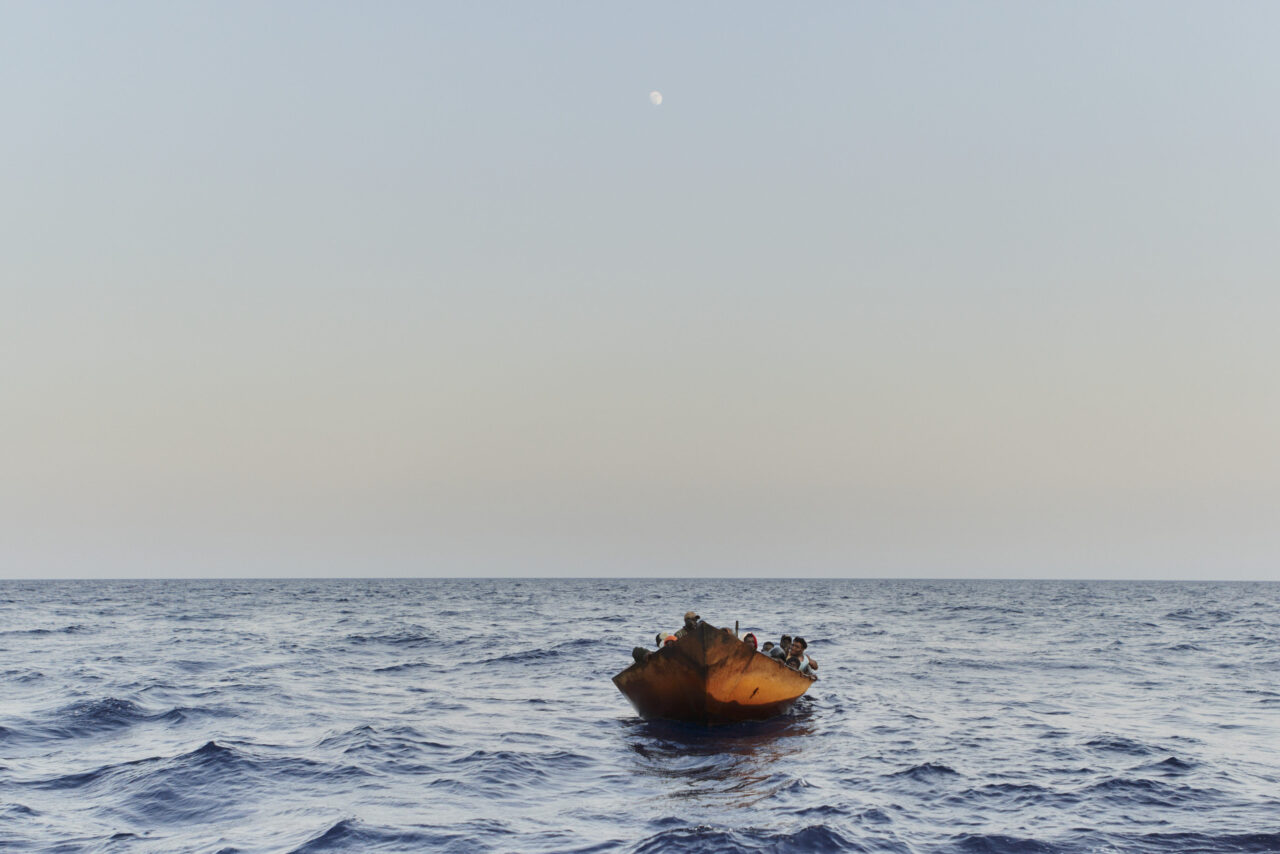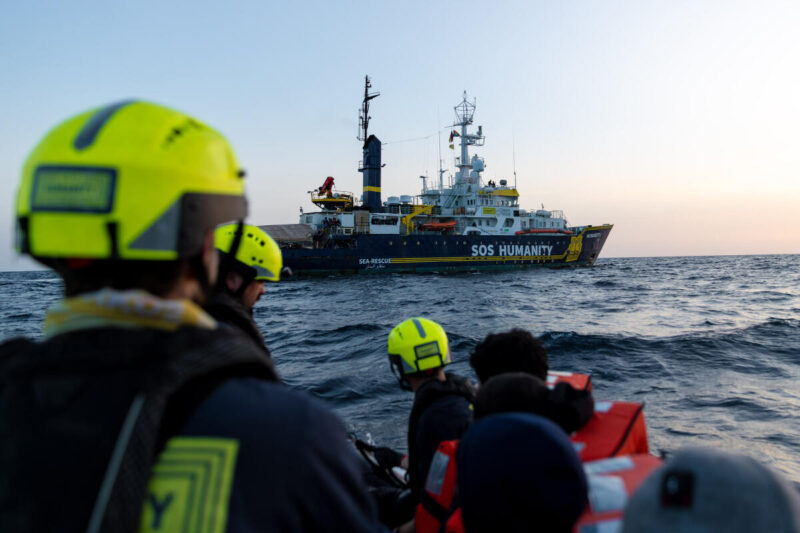Striving for Justice in Libya

Serena Zanirato is a Programmes Officer at Lawyers for Justice in Libya (LFJL) and volunteer at StraLi for strategic litigation. In this interview Serena describes how LFJL is seeking justice and accountability for human rights violations and international crimes in Libya and how her joining the crew of Humanity 1 can both expand and strengthen the respective expertise of LFJL and SOS Humanity.
Joining the crew of Humanity 1 as member of Lawyers for Justice in Libya, can you tell us a little bit about the work of your organisation?
Lawyers for Justice in Libya (LFJL) is a Libyan and international NGO that works on monitoring and documenting human rights violations and serious international crimes – such as war crimes – happening in Libya since 2011, to achieve justice and accountability, and the respect of human rights in the country.
In the last couple of years, we have adopted an innovative lens to our work, and we are focusing on seeking transformative justice in Libya, which means that through our projects we are aiming to create long-term systemic change. Through our work, and together with partners in Libya and beyond, we challenge the underlying social, cultural, economic, ecological and political conditions that give rise to injustice, corruption, and violence in Libya.

For example, in November 2021, together with the European Centre for Constitutional and Human Rights (ECCHR) and the International Federation of Human Rights (FIDH), we have submitted a Communication to the International Criminal Court (ICC), on crimes against humanity against migrants and refugees. We have also published a report that summarises these findings.
Recently, we have released “Escaping Libya’s Detention Industry”, a joint documentary with the interdisciplinary collective Forensis that re-creates in 3D the buildings of both “official” detention centres in the coastal region of west Libya and some places of captivity in the trafficking city of Bani Walid. This work allows to visualise the buildings in which these violations and crimes are perpetrated against migrants and refugees – and to expose them once again. The images and 3D models are based on interviews with experts and testimony from survivors that, at times, for years have been subjected again and again to the cycle of abuses and violations that occur in these detention centres.
Through this work and through the cooperation with SOS Humanity we hope we can “humanise” and give a voice to those who are left behind, who are often just numbers, appearing in statistics in a discourse around migration that completely ignores that we are talking about human beings. It is about managing and preventing migration, rather than shaping it in a responsible and human rights centred way.
Can you explain to a broader audience what strategic litigation is and why it is significant?
At LFJL, we work together with our partners to bring cases to national, regional and international courts. These cases have several objectives – as a human rights organisation, we want to support victims of human rights abuses to access justice and obtain some measure of redress.
What is innovative about strategic litigation is deciding to go beyond the individual victim, and see how, through litigating a specific case, we can address the root causes of the violations. For example, through identifying a specific case, we hope to achieve justice for the victim, and the recognition of such justice for those individuals or groups that, while not being part of the judicial case, are equally victims of same or similar violations. It is basically trying to set a precedent in court, with the intention to do so.
At the same time, we are also trying to achieve a change in the law, or in policy, to prevent future violations. In the context of the violations and crimes committed against migrants and refugees in Libya, we may want to file cases with a view to obtaining a judgment that confirms that crimes against humanity and war crimes are being committed against migrants and refugees in Libya, and that, therefore, cooperation with, and other support of, Libyan authorities must end.
Strategic litigation cases in that context may also aim at holding European actors accountable for complicity in the crimes and violations committed against migrants and refugees and thereby, achieve a change in policy.
Why is it important for you personally and in your professional capacity to join a mission?
As Italian and as a person that worked for quite some time on the matter now, I feel I have a sense of duty to contribute to this cause that is very dear to me, not only through legal and advocacy tools, but also to directly experience what is happening at sea, after migrants and refugees are leaving Libya behind. After listening to the experience of so many survivors, and especially after I have worked with survivors for the documentary with Forensis, I felt it was time for me to come on board, to try to understand the dynamics of what is happening at sea, to give voices, sounds, smells to what I have heard so many times in my personal and professional capacity.
This is why I strongly value the collaboration between LFJL and SOS Humanity: it builds on our work on human rights violations and serious international crimes committed against migrants and refugees in Libya, which is a key priority for us, at LFJL. Be onboard on behalf of LFJL is an important opportunity to broaden our understanding and knowledge about the circumstances of migrants and refugees in their attempts to leaving and after they leave Libya.
Joining forces with SOS Humanity means we can both expand and strengthen our respective expertise. Hopefully, we can continue this cooperation and, in the future, provide more holistic support to migrants and refugees.
In your capacity as a legal expert/strategic litigator you have been working together with SOS Humanity in the past in legal actions. Can you tell us about what we’ve been able to achieve together?
I have started collaborating with SOS Humanity back in 2022 as volunteer Legal Researcher and Head of the Migrants’ Rights team of StraLi for Strategic Litigation, an Italian-based NGO that uses the tool of the strategic litigation to preserve and expand human rights promotion and protection. Together with UpRights, SOS Humanity and StraLi have worked on a project that aimed at using the tool of interim measures before the UN Human Rights Committee to avoid that the Libyan Coast Guard intercepted individuals in distress at sea to bring them back to Libya.
For the first time, on 4 March 2025, the Human Rights Committee issued an unprecedented decision ordering Malta to take all measures necessary to coordinate a search and rescue operation to rescue the 32 persons in distress to ensure that they are not disembarked in a place where they will be at risk of torture and other forms of ill-treatment or risk to their life.
Such interim measures can be indeed used as a precedent, a legal tool through which we hope to change the status quo and the current policies of the EU Member States.

What motivates you to do the work you’re doing and to come on board?
I feel that I have this sense of duty to do what I am doing and to come on board, because I simply and genuinely believe that we are all humans, all the same, and as such, we should also be given the same safety, dignity and opportunities in life. I have decided to try to play my part in this world through legal and advocacy means. I am privileged to being able to call my passion also my job, and to being able to learn and be inspired every day by wonderful colleagues and friends that have the resilience to continue fighting for a better world. Being on board would give me another chance to confirm my purpose, to meet committed colleagues and allow me to experience with different lenses to the work that I am doing.


